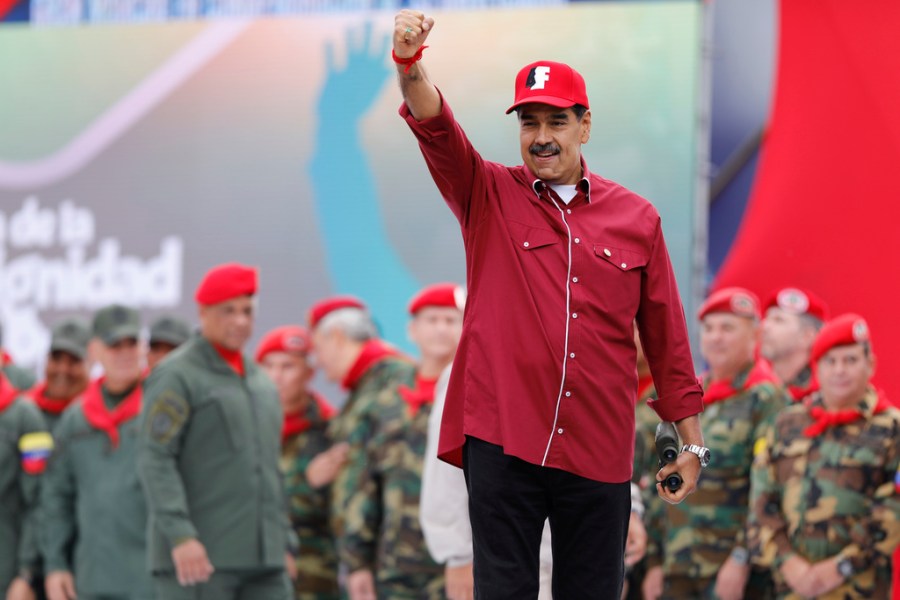
Nicolas Maduro, Venezuela’s socialist tyrant, has given up to the new Trump administration.
He is providing migrants with fully paid return flights; receiving deported of Tren de Aragua criminals; increasing oil production and releasing of American prisoners. The only thing the autocrat is not willing to give up is power, and the new administration seems unwilling to use taxpayer dollars to overthrow his regime.
The Venezuelan oil industry is reaching a million barrels per day, its highest production in five years. On Feb. 1, the U.S. Office of Foreign Assets Control renewed the General License 41 that allows Chevron to operate within Venezuela, and the Trump administration let it through.
Despite this new oil recovery, Maduro is a political orphan at home. He does not enjoy the popular support of his people. The opposition remains strong, and most of the world perceives him as an illegitimate leader with blood on his hands and no respect for human rights.
Trump has not made a final decision on Venezuelan oil. The issue is still under review. In the meantime, though, investors and even some intellectuals consider that U.S. presence in Venezuela is not only necessary but strategic. According to this new narrative, although it seems to normalize the dictatorship, oil production under U.S. and European companies creates jobs, reduces migration and slams the door on China, Russia and Iran.
The division and difficulty over the Venezuela situation is moral, economic and political. Some Trump supporters are betting on deporting all migrants. Others are calling to maintain the Temporary Protected Status for 350,000 Venezuelans. While some investors call to ensure U.S. presence over the oil industry, others insist that this is not a good time to sacrifice democracy on the altar of political revenue.
Given the need to define a clear position on the relationship with Venezuela and its communist regime, there are some essential points to consider:
First, Maduro is an enemy of humanity. Secretary of State Marco Rubio put it clearly: The Maduro regime tortures, murders and forces millions of its citizens into exile. He is a nefarious partner of terrorist groups in Iran, Hezbollah and Hamas — in other words, an enemy of Israel and the United States.
Venezuela leads Latin America in the number of political prisoners it holds — 1,687 political prisoners as of last month, followed by Cuba at 1,150, Bolivia at 300 and Nicaragua at 47.
Admiral Alvin Holsey, head of the U.S. Southern Command, recently told the Senate that the authoritarian Maduro and his regime are engaged in narcoterrorism, corruption, drug trafficking, money laundering, human rights abuses and other nefarious activities.
Second, Venezuelan democracy is not worth selling at the price of oil. Rep. María Elvira Salazar (R-Fla.) has said it loud and clear: “If we don’t push for Nicolas Maduro and Diosdado Cabello to leave power, it will come back to haunt us.”
Third, the relaxation of sanctions must stop. The two years of relaxation of sanctions and the continuation of the OFAC license have provided oxygen to the tyrant funding his military and his supporters.
Fourth, pressure on Maduro has worked in the past. Between 2018 and 2022, the Trump administration’s policy of maximum pressure forced Maduro to begin a process of dialogue that would later lead to his crushing electoral defeat — an outcome he did not respect but could not completely avoid.
Fifth, Maduro’s criminal organization, Cartel de los Soles, must be included by Trump on the U.S. list of terrorist organizations. This should not be negotiated, nor granted as a peace offering. This key decision will close the doors to the dictatorship and its various dirty businesses such as drug trafficking, blood-gold, oil smuggling and many others.
Although “pragmatic” voices are urging Trump to lift sanctions, reach a deal and coexist with the tyrant, the truth is that dictatorships understand only pressure and punishment. A bad agreement now does not eliminate the crisis — it only postpones and worsens it.
Today more than ever, more pressure is required against the tyrant and greater international support is needed for those freedom fighters opposing the regime. The people have already done their part; it is up to the international community to do the same. This is no time to throw in the towel.
Arturo McFields is an exiled journalist, former ambassador to the Organization of American States and former member of the Norwegian Peace Corps. He is an alumnus of the National Defense University’s Security and Defense Seminar and the Harvard Leadership course.

